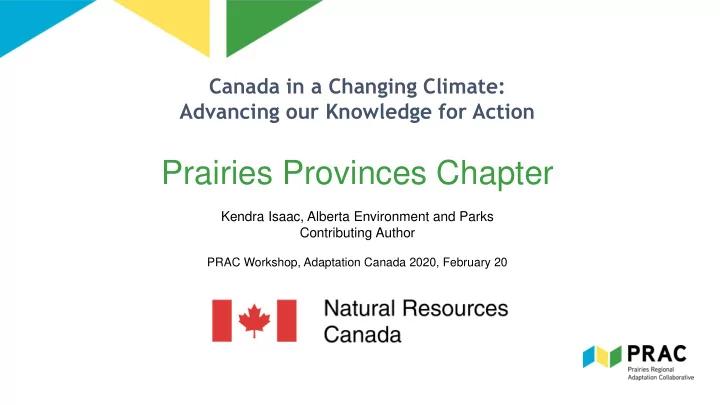

Canada in a Changing Climate: Advancing our Knowledge for Action Prairies Provinces Chapter Kendra Isaac, Alberta Environment and Parks Contributing Author PRAC Workshop, Adaptation Canada 2020, February 20
National Assessment Process https://changingclimate.c a/
Name Affiliation Prairie Dave Sauchyn PARC (U of R) Chapter - Debra Davidson U of A Mark Johnston SRC Lead and Amber Fletcher U of R Contributing Brenda Parlee U of A Authors David Natcher U of S Elaine Wheaton U of S Ian Mauro PCC (U of W) Jeremy Pittman Waterloo Kendra Isaac GoA Maureen Reed U of S Megan Van Ham Alberta WaterSmart Mike Flannigan U of A Richard Schneider U of A Suren Kulshreshtha U of S �
Context/Background • Diverse region from Rocky Mountains to subarctic Canadian shield; and from large cities to remote rural communities. • Relatively large urban Indigenous population. • Non-renewable resources - oil and gas, mining – a major economic driver. • More than 80% of Canada’s agricultural land and most of the country’s irrigated land. • The water resources, ecosystems and resource economies are sensitive to variations in climate (e.g. drought). • Exposed to projected temperature increases that are greater than elsewhere in southern Canada. • Periodic rapid economic growth (especially in Alberta), a population shift from rural to urban. 4
Prairies Chapter – Key Messages Ecosystems: • Large regions of boreal forest could eventually transition to aspen parkland and grassland ecosystems, while entire mountain ecosystems could disappear. • Although biodiversity is expected to increase overall ... there would be both an absolute loss of some species and species redistribution. • Successful adaptation will involve active management intervention. 5
Schneider et al. (2015) 6
Prairies Chapter – Key Messages Extreme weather events: • Among the most challenging consequences of climate change. • Unprecedented impacts in recent years. • Provincial and municipal governments have responded by proposing policies, structures and practices. 7
Prairies Chapter - Key Messages Water Resources: • Regional land use policy and planning, in addition to emergency preparedness, is critical. • Collaboration improves the likelihood of successful implementation of adaptation measures at a regional level. • Watershed stewardship groups, rural municipalities and conservation districts to encourage land and water practices that prevent or minimize adverse impacts of excesses and shortages of water. 8
Prairies Chapter - Key Messages Agriculture: • Achieving the net benefits of higher temperatures and a longer growing season will require adaptation to limit the impacts of climate extremes and increased risks of pests, vector borne diseases and invasive species. • Limitations of financial resources and institutional support remain barriers to adaptation. 9
Prairies Chapter - Key Messages Social Considerations: • The impacts of climate change may exacerbate existing societal inequities. • Social groups, such as Indigenous peoples, women, people of low socio- economic status, and youth or elders have unique sources of vulnerability and strength, which should be considered in public policy development. • Adaptation planning and policy is more effective when it considers the means by which race, age, gender and poverty amplify people’s vulnerability or resilience to climate hazards. 10
11
Prairies Chapter - Key Messages Adaptation planning: • Cities are at the forefront of adaptation and resilience planning in the Prairie Provinces. • Many policies do not consider future climate or identify future risks based on a limited view of historical variability. • Approaches for assessing the effectiveness of adaptation efforts and meaningfully reporting progress towards resilience goals are needed. 12
Thank you! Questions? 13
Recommend
More recommend